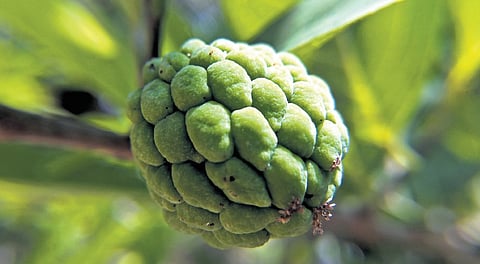

KOCHI: With a scaly, green exterior, which is a sharp contrast to its sweet and creamy pulp, sitaphal is ubiquitous in tropical countries. So it’s no surprise that we have them all over the country. It is widely grown in many parts of India, particularly in Maharashtra.
Many find its taste and consistency similar to custard, which earned it the familiar moniker ‘custard apple’. Malayalis will, however, know it best as seethapazham or aathakka. The spherical fruit’s other names are sugar apple and sweet sop.
While you can enjoy the fruit as is, sitaphal is often used as a key ingredient in many delectable dishes — from milkshakes and puddings to ice-creams and kheer, the list keeps going.
Origins
Sitaphal is not native to India. Its roots go back to South America and the West Indies. It is believed that the Portuguese brought the fruit to India in the 16th century.
There have been several explanations regarding how the fruit got its name. Some say that the name is connected to Sita from the popular Hindu epic, Ramayana.
It is said that Sita used to eat the fruit during her 14-year exile with her husband Rama. Another origin story says sitaphal the fruit sprang from Sita’s tears when she was abducted by the demon king Ravana.
Some others trace back the origin of the name to Sanskrit, in which sheeth means cold and phal means fruit.
Health benefits
Sitaphal is praised for its numerous health benefits.
Rich in vitamin C, potassium, magnesium and antioxidants, this fruit is known to improve cardiovascular health, eyesight and immunity, and even enhances mood. They are also capable of reducing signs of ageing and promoting healthy skin.
In addition, the fibre content in sitaphal aids digestion. They are beneficial to people with acidity and stomach ulcers. There is also speculation that sitaphal might have anti-cancer properties as well. Add to the list its anti-diabetes property and the fruit becomes a much-needed addition to your diet.
The leaves and seeds of sitaphal are often used as an insecticide.
Considered a winter fruit, the custard apple is mostly harvested in the months of October and November.
Ramphal or Bullock’s heart, a heart-shaped reddish fruit that bears a close resemblance to sitaphal, belongs to the same family.
Custard Apple Trivia
The antioxidants in custard apples are believed to remove free radicals from the body, which are associated with chronic diseases and cell damage
A great source of vitamin B6, custard apples are known to increase your serotonin and dopamine levels, improving your mood and reducing the risk of mood disorders like depression
The seeds of the custard apple may contain toxins and hence, are inedible
Custard apples are also rich in carbohydrates, calcium, iron, phosphorus, and sodium
The leaves, seeds, bark and roots of the custard apple are used for medicinal purposes
Sitafal Kulfi
Recipe by Chef Arun Vijayan
INGREDIENTS
Sitafal puree: 250g
Milk :500ml
Condensed milk :200g
Corn flour: 1 tbsp
Almond: 3-4 no.
Method
Add some corn flour and mix it with two tablespoons of milk. Make sure the flour gets diluted. Heat the remaining milk in a thick-bottomed saucepan for about 15- 20 minutes. Stir in between, until it thickens. Add the dissolved corn flour into it, mix well and heat for another 5 minutes. Then let it cool. Stir in the sitphal puree and also add some chopped almonds. Pour into your moulds/cups/ freezer-friendly container or in a parchment-lined loaf pan. Freeze for 4 to 6 hours or overnight. While serving, run a knife along the inner edge of your mould or dip the mould in warm water for the kulfi to pop out.
Sitaphal Custard
Recipes by: Ann Mary J, Elize Patisserie
INGREDIENTS
Egg yolk: 40g
Sugar: 50g
Corn flour: 15g
Milk: 150g
Sitaphal (custard apple): 70g
Method: In a bowl, mix the egg yolk, sugar, and corn flour until smooth. In a thick-bottomed pan, heat the milk until it just starts to boil. Once the milk is hot, pour half of it into the egg yolk mixture, stirring constantly. Pour the tempered egg yolk mixture back into the pan with the remaining milk, whisking continuously. Keep whisking until the mixture thickens to a custard-like consistency. Remove the pan from heat and add the sitaphal pulp. Stir until well combined. Once the mixture has cooled, garnish with nuts of your choice, if desired, and enjoy!
Custard Apple & Rum
(@ilovemydrinks)
INGREDIENTS
Rum: 45ml
Custard apple pulp: 30ml
Fresh cream: 10ml
Liquor: 15ml
Bitters (flavour extracts) -
As needed
Method: Mix all the ingredients in a shaker and pour it into a cocktail glass. Add a small dash of bitters and the cocktail is ready.
Custard Apple Cocktails
INGREDIENTS
Muddled custard apple: 45 ml
White rum: 15 ml
Liquor: 30 ml
Lime Juice: 25 ml
Vanilla syrup
Method
Add all the ingredients to a martini glass. Top with a desired amount of ice. Garnish with a piece of custard apple and you are good to go!
Sitaphal Semolina Payasam
Recipe by Priya Harikumar
INGREDIENTS
Sitaphal: 1 medium-sized
Semolina: 4 tbsp
Sugar: 8 tbsp
Water: 1 cup
Full-fat milk: 500ml
Cardamom powder: 1 tsp
Ghee: 2 tbsp
Saffron: A few strands
Ghee-roasted cashew nuts, slivered almonds
Method: Deseed and mash the pulp. Heat the kadai and add 1 tbsp of ghee. Roast the semolina in it for 1 minute. Add sugar and mix on low flame. Add 1 cup of boiled water and cook until semolina softens. Stir occasionally. When the mixture thickens, add cardamom and full-fat milk. Continue to boil until it thickens. In a small pan, roast cashew and almonds in 1 tbsp ghee. Add saffron to payasam. Garnish with nuts.
Sitafal Milk Shake
INGREDIENTS
Sitafal puree : 200g
Sugar : 50g
Honey : 50g
Cashew nuts: 40g
Vanilla ice cream: 1 scoop
Frozen milk: 250 ml
Method
Blend all the ingredients and garnish with some chopped almond slices.